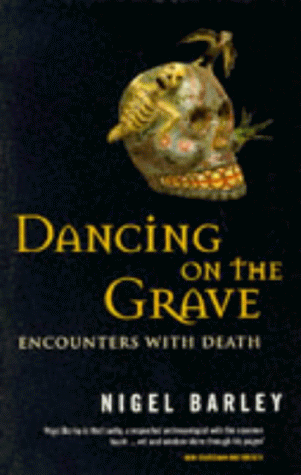Dancing on the Graves: How different cultures deal with death

How we deal with death says a lot about who we are and how we choose to live. Coming from Egypt, a death-obsessed culture, I am familiar with the ancients' firm belief in an afterlife and how they might financially ruin themselves in order to deal with the death of one person. The reasoning being, since you are sure you are going to return in a bodily form, you might as well pack all your treasured belongs with you.
Other cultures, discussed in Nigel Barley's fascinating study, Dancing on the Graves ran the gamut in their emotional and ritualistic responses to the death of a loved one: from celebrating their life, to mourning it, operatically, whether privately or publicly, dressed in white, black or colorful costumes. Some nomadic peoples of southern Africa, merely pulled down the roof of their dwelling onto the body and move on; the wrapped bodies in Torajan (Indonesian) houses are used as shelves.

Mexicans, of course, are another death-fixated culture and celebrate death, extravagantly. Day of the Dead (Día de Muertos) in Mexico falls between October 31st and November 2nd, and is not a depressing affair. Rather, on this holiday, Mexicans honor their dearly departed, festively, with song, dance and fanciful dress. Food is also an important component of this celebration, and members prepare the favorite dishes of their deceased.

As Barley's book details, the myths surrounding death and beliefs regarding mourning are as varied as humans: with joking at funerals, post-mortem videos and even cannibalism. Yesterday, over dinner with a friend, I got to learn of another rich and colorful tradition: Colombia's.
Like Mexicans, Colombians are an emotional, expressive and imaginative people -- after all, it was the Colombian Nobel prize winner, Gabriel García Márquez, who introduced magical realism as a narrative technique: where supernatural and everyday events are woven, matter-of-factly.
So, it was not too, too surprising to learn how folklore intersected with religious practice at the site of cemeteries. For example, there is a ritual in Colombian towns/villages where a shaman-type visits cemeteries to awaken the dead, collect their souls, and then with the spirits trailing behind him, proceeds to knock on neighboring doors asking for prayers to save souls in purgatory.
Interestingly, the cemetery, can also serve as a place to party, albeit broken-heartedly. I also learned, yesterday, that Mother's Day is a big deal in Colombia -- with all day, sentimental propaganda on TV and the radio tugging at the heart strings (not unlike Egypt, I noted). But, what is very different from my motherland was that Mother's Day in Colombia could also be celebrated at the cemetery, with Mariachis (a small, strolling band of trumpeters, guitarists, and violinists) heavy drinking and tragi-comic songs. Oh, those Latin Americans!

Word..... this super cool if you read it well you gonna understand I love this 😍